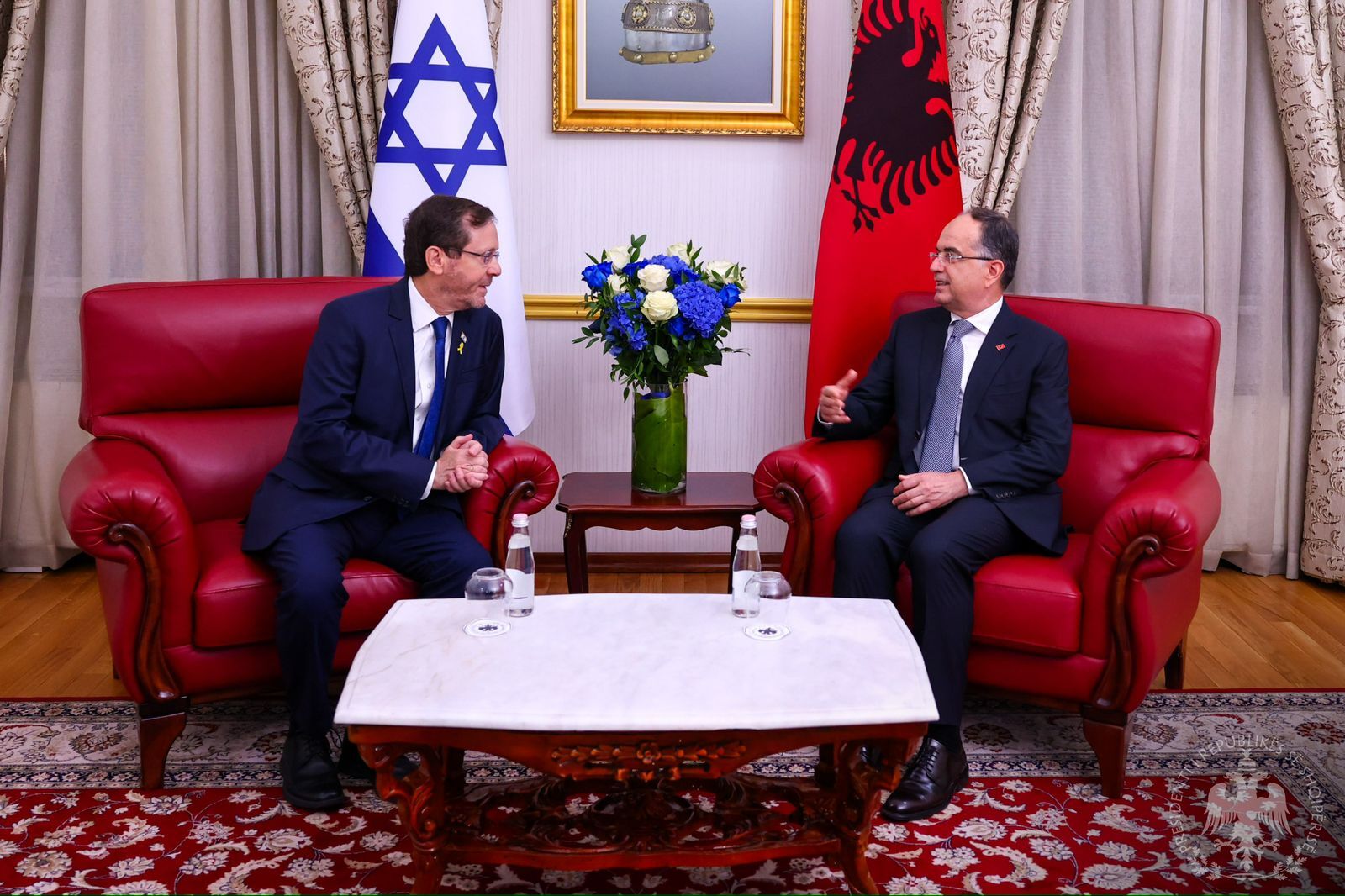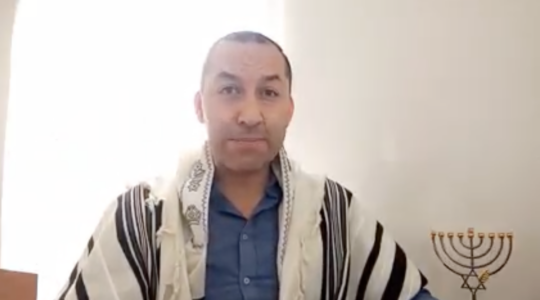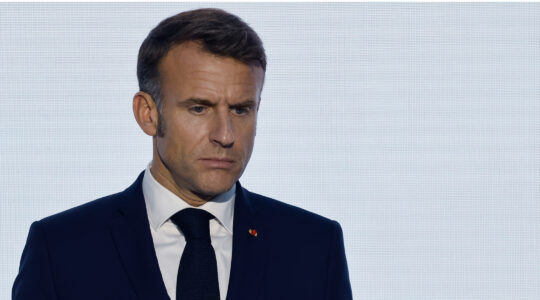ELBASAN, Albania — Isaac Herzog’s visit to Albania Thursday marked the first time an Israeli leader set foot in the only European country that ended World War II with more Jews than it started with.
Albania’s role in saving Jews during the Holocaust was a key theme of the Israeli president’s brief visit, which included a ceremony at the Holocaust memorial in Tirana as well as meetings with descendants of some of the 75 Muslims, Catholics and Orthodox Christians listed by Israel’s Yad Vashem as Righteous Gentiles — those who risked their lives to save Jews from deportation to Nazi death camps following Germany’s occupation of Albania in September 1943.
“Albanians hid Jews without regard to where they came from, or whether they were rich or poor,” Petrit Zorba, head of the Albanian-Israeli Friendship Association, told the Jewish Telegraphic Agency in Elbasan, a small city about one hour’s drive south of the capital Tirana.
Zorba estimated that up to 3,000 foreign Jews found refuge in Albania during World War II. “Only 100 meters from here lived the Kurmaku family, one of the families that protected Jewish people,” he said. “These houses have lately become tourist attractions visited by Israelis and others.”
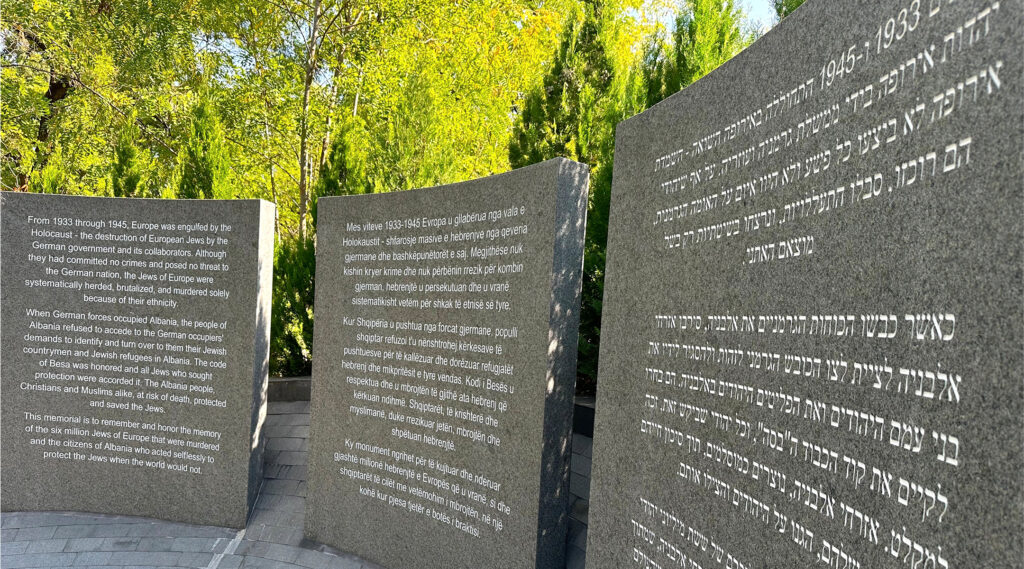
Albania’s national Holocaust memorial, situated in a Tirana park, has commemorative plaques in Albanian, English and Hebrew. (Larry Luxner)
Yet youths in this once-Marxist nation of 2.6 million know nearly nothing of that unique legacy, according to Florenca Stafa, director of the Albanian and Balkan Research Center at the University of Elbasan, Albania’s largest and oldest teaching college.
“During communism, nobody spoke about the Holocaust. The topic was never taught in school,” said Stafa, 41, whose father was jailed for two years in the late 1960s simply for complaining there was no bread to eat. “Even after the regime collapsed, in the 1990s, it was still an unknown concept. So for me, as a professor, it’s important for us to do something about this.”
To that end, Stafa helped organize a conference for 25 teachers last week in Elbasan. The five-day event was co-sponsored by the Albanian History Teachers Association and The Olga Lengyel Institute, or TOLI, a New York-based nonprofit that promotes Holocaust education throughout the United States and Europe.
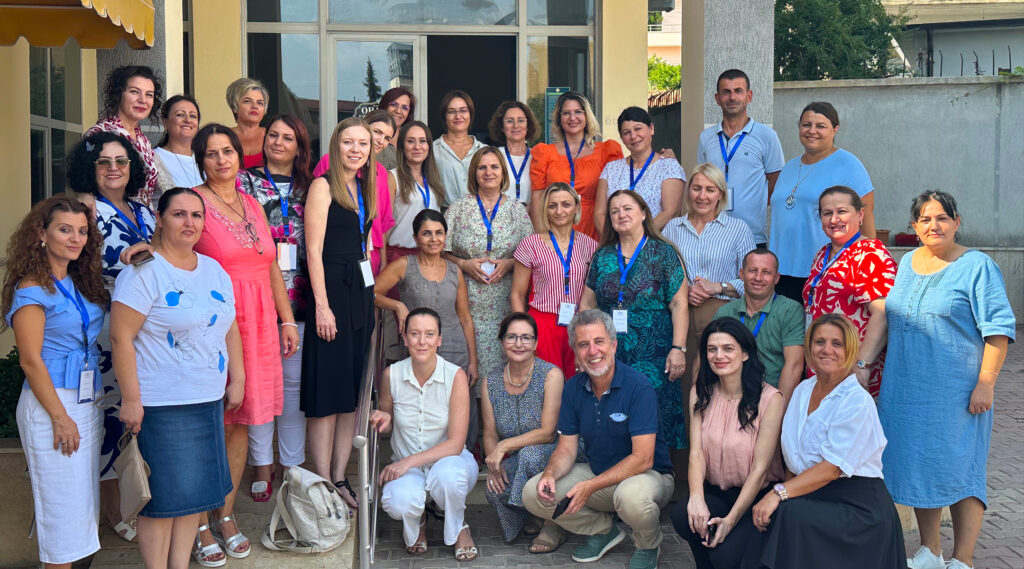
History teachers attending the Sept. 2-6 Holocaust education conference organized by TOLI gather for a group photo at Albania’s University of Elbasan. (Larry Luxner)
Oana Nestian-Sandu , TOLI’s international program director, said Albania is the 14th country outside the U.S. to host a TOLI seminar for teachers since 2012, and the only one among the 14 where antisemitism — rampant across much of Eastern Europe — has hardly been an issue.
“Because we are educators, we have to study what’s the best way to present this immense topic to our students,” she explained. “For them, it’s something that happened almost 100 years ago. But research has shown that through diaries, students can connect, and they become not only interested in it but committed to learning more — even in their free time — and be inspired by it.”
Albana Ndoja, 47, is a longtime history teacher and vice-director of the Kolë Idromeno High School in Shködra, a predominantly Catholic city. She first heard about the Shoah during a 2016 week-long group visit to Yad Vashem that was organized by Albania’s Ministry of Culture.
“We taught about World War II and the ancient world, but never about the Holocaust,” said Ndoja, a Muslim. She noted that in her hometown, the family of Agostin and Gysepina Çiftja sheltered a Jewish family for one year, even though their house was next to a Nazi garrison.
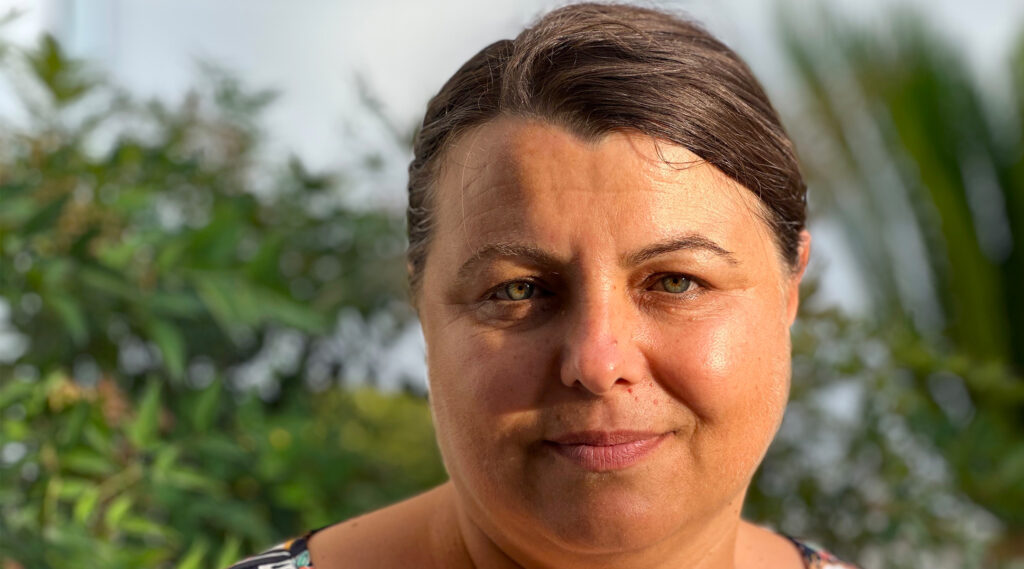
Albana Ndoja, 47, a history teacher in Shködra, attends a Holocaust education conference sponsored by TOLI in Elbasan, Albania, September 2024. (Larry Luxner)
“The bishops of Shködra gave them Catholic identities, but they never tried to convert them. After a year, they got new passports and helped them go to Macedonia. Along with my students, I’m trying to gather all the histories of families in our city who did this,” she said, adding that “if we don’t learn from the past, we cannot learn how to protect ourselves in the future.”
Klodeta Cane, an Albanian Jew and Holocaust educator, said Adolf Hitler’s autobiography, “Mein Kampf,” has enjoyed strong sales in Albania of late. When she recently discovered a copy of the notoriously antisemitic book in the car of a municipal official in Vlora and asked him about it, the official responded: “We were just curious and wanted to read it.”
Cane added that Hitler exploited Germany’s economic devastation following the First World War to scapegoat Jews. She worries that sentiment could also shift in the Balkans, where “the radicalization of Islam is growing, and organizations are paying money to buy their souls” — that is, worshippers are offered cash incentives to attend mosques.
Gadi Luzzetto-Voghuera, director of Italy’s Fondazione Centro di Documentazione Ebraica Contemporanea, agrees with that assessment—especially after Oct. 7 and the dramatic rise in anti-Zionist and pro-Hamas sentiments throughout the West, and among intellectuals.
Some of the speakers and participants cited frequent and harsh criticism of Israel’s war in Gaza in the Albanian media.
“Antisemitism is not an important issue for Albanian society, but it is important politically for the entire world, especially in Europe,” said Luzzetto-Voghuera, a speaker at the Elbasan event. “It’s being used as a political tool, even in countries like Albania where few Jews live.”
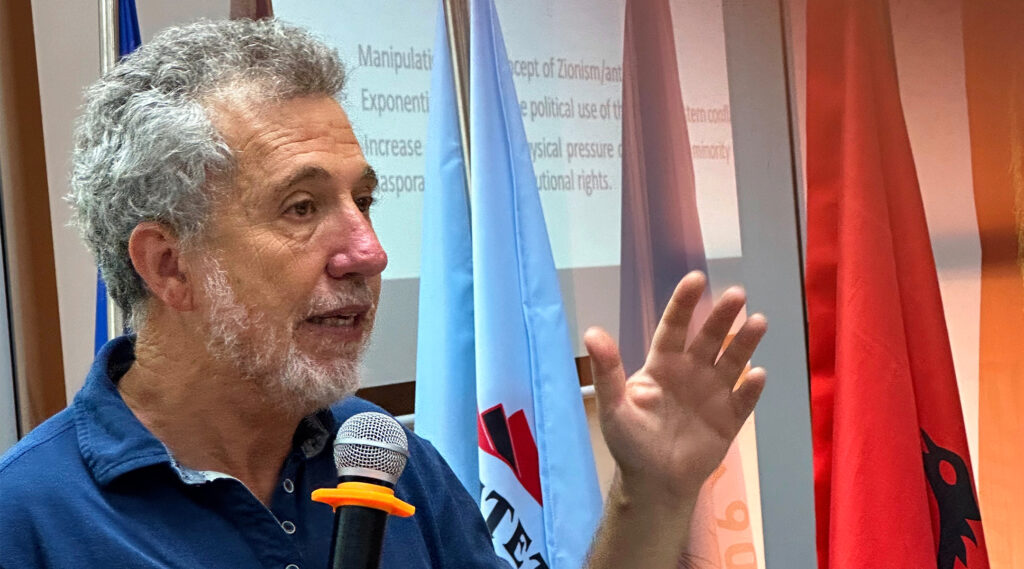
Gadi Luzzetto-Voghuera, director of Italy’s Fondazione Centro di Documentazione Ebraica Contemporanea, speaks at the TOLI Holocaust conference in Elbasan, Albania, Sept. 3, 2024. (Larry Luxner)
Elda Dermyshi, 54, has been teaching high-school history in Elbasan for 32 years. She said the Holocaust has recently become “a very sensitive issue” in Albania due to the conflict in Gaza.
“Everyone on TV is talking about this war and they connect it to the Holocaust and antisemitism. Back then, it was the Jews who were persecuted. Now the Jews themselves are accused of being the persecutors,” Dermyshi said, declining to discuss her own views. “What I understand from this conference is that we must treat the Holocaust as a multidimensional issue strongly related to human rights and cultural diversity, to refuse to accept stereotypes, and to practice tolerance.”
Today, the formerly Marxist dictatorship is home to perhaps 60 Jews—nearly all of them in Tirana—though its government is quite pro-Israel. Prime Minister Edi Rama, who met with Herzog during his visit, is currently overseeing the construction of two museums honoring Jewish history and Albania’s wartime rescue of Jews: one in Tirana, and the other in Vlora.
Alket Shehaj, 39, was one of the few male attendees at the TOLI conference. A middle-school history and geography teacher from the southern town of Fier, Shehaj acknowledged the rise of violent extremism in the Balkans but said education and a stable family life can counter that.
“Albanians have shown throughout history that we are a nation which embraces values and traditions, and we’ve always sought peaceful relations with our neighbors,” Shehaj said. “We have heard about the Holocaust since we were little. This is a subject we need to study in depth.”
Each teacher attending the TOLI conference received three books: “Flower of Vlora: Growing Up Jewish in Communist Albania,” an autobiography by retired Florida dentist Anna Kohen; an Albanian translation of “The Diary of Anne Frank” and “Izraelitët në Shqipëri” (“Jews in Albania”) by Josef Jakoel.
Felicita Jakoel is the daughter of Josef Jakoel, the patriarch of what was then a 300-member Jewish community that emigrated en masse to Israel in 1991 after the fall of communism.
“My father was worried that because we were living in a closed country, it would be forgotten that a Jewish community once thrived here. He loved history, he was an economist, and he spoke many languages, so it was his moral duty to write the history of Jews in Albania,” she said.
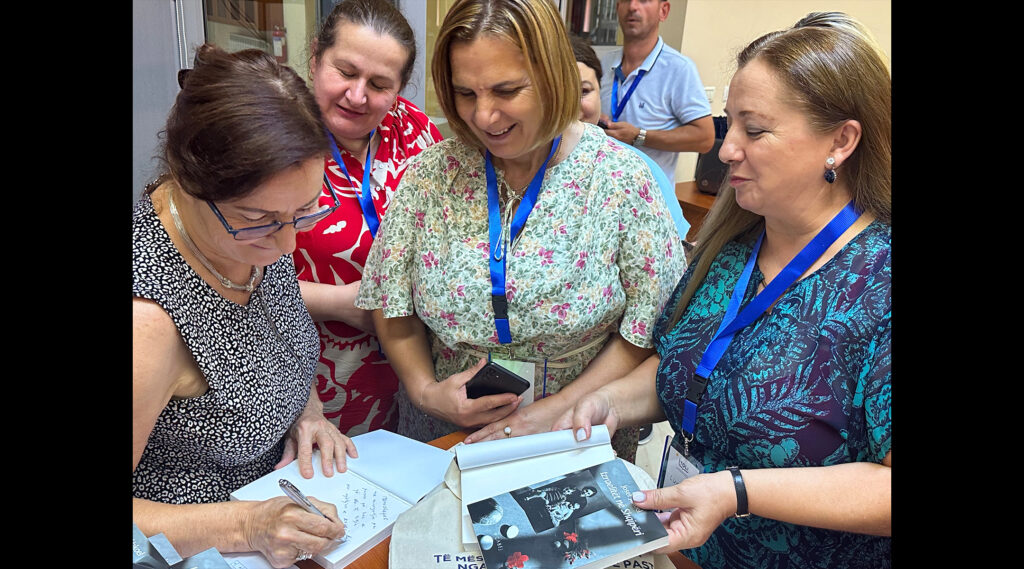
Felicita Jakoel autographs copies of her father’s book on the history of Albania’s Jews, “Izraelitët në Shqipëri,” during the TOLI conference held in Elbasan, Albania, Sept. 2-6. (Larry Luxner)
Jakoel, who has lived in Israel since 1991, told teachers that the Jewish presence in Albania dates back 2,000 years — as evidenced by the ruins of an ancient synagogue in Saranda, along the country’s Adriatic coast near the Greek border. Jews also flourished in Berat and Elbasan, but enjoyed their strongest presence in Vlora, where a merchant class thrived until the Italian occupation in 1939.
Yet the Albanian people’s determination to hide Jews from the Nazis at enormous personal risk paid off. By the war’s end, the Nazis had killed only one Albanian family out of a native Jewish population of 300 and perhaps thousands of refugees from neighboring countries. In contrast, of the 2,000 or so prewar Jews who lived on the Greek island of Corfu—just off Albania’s coast—only 187 survived. The rest were all deported to Auschwitz.
‘What happened here in Albania didn’t happen in any other country in Europe,” said Jakoel, 67. “In Denmark, Danish Jews were saved. But in Albania, so were Jews who came from other countries. This is a very important topic to be integrated in schools. We should teach new generations about what we did during the Holocaust.”
TOLI’s Nestian-Sandu said she hopes to make the seminar an annual event in this country, and next year to include Albanian-speaking teachers from neighboring Kosovo as well.
“It’s not enough just to tell the story of these wonderful people who saved so many Jews,” she said. “It’s equally important to inspire students to be active citizens and help those around them.”
JTA has documented Jewish history in real-time for over a century. Keep our journalism strong by joining us in supporting independent, award-winning reporting.
